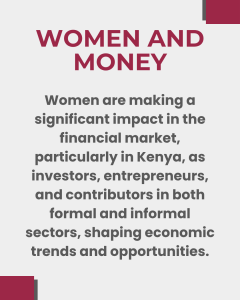The Evolving Role of Women in Kenya’s Economy: Leadership, Investment, and Opportunity in the Modern Era

In today’s Kenya, the economic landscape is witnessing a powerful shift as women increasingly step into roles of leadership, investment, and entrepreneurship. The contributions of women to the national economy are no longer peripheral—they are pivotal. Across corporate boardrooms, investment forums, innovation hubs, and informal markets, Kenyan women are asserting themselves as drivers of economic transformation.
Women in Leadership: Breaking Barriers and Leading Change
In recent years, Kenya has seen a rise in the number of women taking on leadership roles in both the public and private sectors. From Cabinet Secretaries and County Governors to CEOs and founders of thriving enterprises, women are proving that leadership is not bound by gender. The 2010 Constitution of Kenya was a game-changer, establishing the two-thirds gender rule and promoting women’s inclusion in political and economic decision-making.
In the corporate world, women like Betty Maina (former Cabinet Secretary for Trade and Industrialization) and Dr. Jennifer Riria (founder of Kenya Women Holding, now Echo Network Africa) exemplify the new wave of female leaders who are shaping policy, innovation, and finance. This rise in female leadership not only empowers women but also promotes inclusive development and better governance. Research shows that companies and governments with more women in leadership are more likely to prioritize education, health, and community-driven policies.
Women as Entrepreneurs and Investors: Driving Growth from the Ground Up
Kenyan women are not just leading from the top—they are building from the ground up. From agribusiness to fintech, fashion, hospitality, and trade, women-owned businesses are thriving. Initiatives such as the Ajira Digital Program, Women Enterprise Fund (WEF), and Uwezo Fund have created platforms for women to access capital, digital skills, and mentorship—tools previously out of reach.
Women like Njeri Rionge, one of Africa’s serial tech entrepreneurs, and Tabitha Karanja, the founder of Keroche Breweries, demonstrate the powerful potential of female-led enterprises to generate employment, wealth, and innovation. Moreover, the surge in chamas (investment groups) has enabled many Kenyan women to collectively pool resources, invest in real estate, Saccos, and the stock market—creating informal but impactful financial ecosystems.
Opportunities and the Significance of Inclusion
The digital economy has opened up new frontiers for Kenyan women to explore global markets, remote work, e-commerce, and digital finance. This access is leveling the playing field and allowing women in both urban and rural areas to participate in meaningful economic activities.
Government and private-sector policies promoting financial inclusion, maternal health, education, and gender-responsive procurement are creating environments where women can thrive. When women have equal access to resources and opportunities, the entire economy benefits. A McKinsey report noted that advancing gender equality in Africa could add $316 billion to the continent’s GDP by 2025—with Kenya playing a central role in that growth.
The Time is Now
The role of women in Kenya’s economy today cannot be understated. As leaders, investors, and entrepreneurs, they are no longer waiting for permission—they are taking up space. With supportive policies, increased access to capital and education, and the power of networks, Kenyan women are shaping a future where economic growth is inclusive, equitable, and transformative. The time is now to invest in women—not just for gender equality, but for national prosperity.







